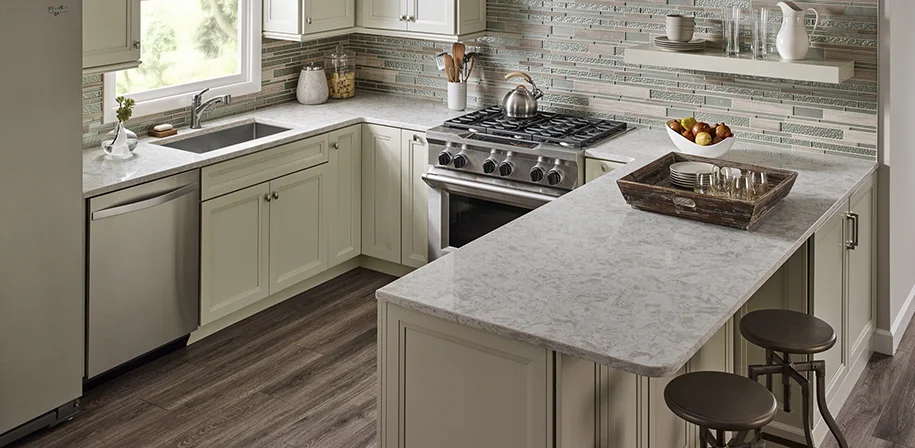Laminate
Laminate countertops have been very popular for years because they are affordable and readily available. You may know them better by their common brand names, like Formica. Laminate countertops are made of thin layers of plastic which is laminated to particleboard. You’ll often see them installed with a coved backsplash.
For the price, they perform well in a kitchen setting. They are durable and clean easily. Higher end surfaces such as granite have better heat and scratch resistance, though.
Corian
Corian is made up of binding resins, various minerals, and dyes and other fillers that provide color and texture. Corian is a brand manufactured by DuPont.
As a man-made material, Corian is incredibly versatile. It can be integrated with stone, glass, and wood, and because of how pliable it is when heated it can be shaped, engraved, or carved however you want. It’s also available in a wide variety of colors, and even textures and patterns that make it look like it’s made from stone or wood.
Unlike granite, Corian doesn’t need sealing. It will be fine even if you spill acidic materials on it. However, it can be scratched or nicked if you slice or cut food on top of it without using a chopping board. Minor scratches, in any case, can be buffed out using a scouring pad.
While natural stone does get valued higher than solid surface countertops, that doesn’t mean that the nearly similarly-priced Corian will be a deal breaker.Being a pioneer among solid surface countertop materials, Corian is highly-recognizable as a brand.
Granite
Granite countertops are solid, durable and stain resistant. They can withstand the heat from cooking or serving food. With normal wear and tear, granite is difficult to break, crack, or scratch.
Granite is available in a variety of colors, such as tan, gray, yellow-gold, brown, off-white, taupe, peach and blue-gray. However, because it's a natural stone, color options are limited when compared to color-enhanced quartz varieties.
Opt for granite if you want low-maintenance countertops that don't fade or discolor over time and aren't sensitive to cleaning chemicals. Granite will need occasional sealants to ensure its luster and longevity.
Quartz
Quartz countertops have much of the same benefits of granite, except they’re not entirely natural. Quartz countertops are made from approximately 93 percent crushed quartz, 7 percent resin, and some dyes for coloration. Without color enhancements, natural quartz is somewhat dull and unappealing.
Quartz is a great option if you want a nonporous option that requires zero upkeep and never requires top coat applications. The composition of quartz is relatively uniform so it doesn't have as many natural grains, flecks or veins as granite or marble.
Marble
Marble countertops are known for being well-made and structurally sound but less forgiving than granite or quartz, which is why they are better utilized in rooms like bathrooms. Marble is the most porous of the three and is especially sensitive to acidic liquids and potent chemical cleaners. For example, wine can stain marble countertops if not wiped away quickly. A high-grade sealant is necessary to protect the surface, but is often applied by manufacturers or installation specialists.
Select marble countertops if you want a design with the most unique, unpredictable veining and natural modeling. Marble tends to darken slightly over time.











